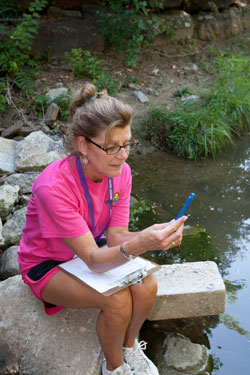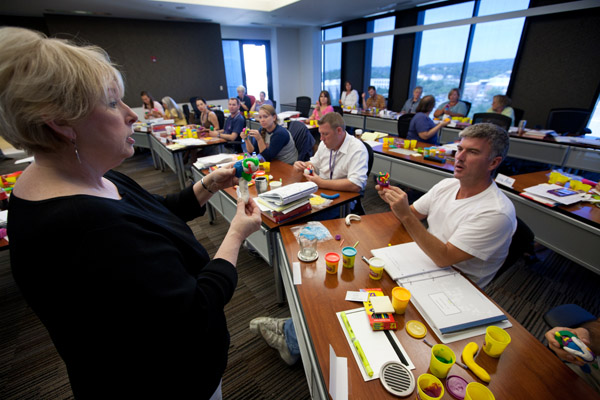Modeling brains in psychedelic shades of Play-Doh and wading knee-deep into Mullins Creek to measure dissolved oxygen in the water were among the hands-on learning activities presented at the Advanced Placement Summer Institute (APSI) hosted by the Honors College July 25 – 28.
More than 350 middle and high-school teachers from throughout the region and from as far away as London, England and Alexandria, Egypt traveled to campus to participate in four days of in-depth preparation for teaching advanced placement courses that ranged from psychology to environmental science. “That’s a 25% increase in attendance over last year, and speaks to the quality of the conference,” said Maribeth Lynes, assistant dean and director of recruitment for the Honors College, who directs APSI.
The APSI workshop lasts less than one week, but Lynes and various Honors College and Global Campus staff members work year-round to pull it off. The week of the event, it’s all hands on deck, supplemented by a small army of student workers.
Given that the Honors College operates with an extremely lean staff, it’s fair to ask: Why does the college invest this kind of time and effort in a four-day workshop?
“APSI is a powerful tool for recruiting future honors students,” Maribeth Lynes said. “The workshop allows us to showcase our facilities, our faculty and our student successes, and it creates goodwill ambassadors among the teachers who attend.”

Jennifer Fogleman checks the dissolved oxygen in Mullins Creek, one of the hand's-on activities in the environmental science course.
Looking beyond recruitment, the annual workshop has had a major impact on the quality of instruction in Arkansas and beyond. “We are teaching teachers creative ways to help students learn and become excited about learning,” said Carol Gattis, associate dean of the Honors College. “The increase in the number of AP classes in Arkansas the last several years has been touted nationally, and we are part of making that happen.” Indeed, the College Board reports that the percentage of Arkansas high school seniors who took an AP exam increased from 8.6% to 36.6% from 2001 to 2010, placing Arkansas first in the nation in expanding senior participation.
By invigorating teachers and sharing new ideas with them, the four-day workshop has a long-term impact on students and their futures. “Each of these teachers prepare and influence an average of 150 students in their classrooms each year,” Lynes pointed out.
Participating teachers were enthusiastic about the conference. Lesa Ohnstad, a junior high school teacher from Springdale, Ark. who took the pre-AP social studies course, noted: “I don’t know when I’ve received more valuable information. We’re always encouraged by our administrator to ‘take students to a higher level.’ Now, I feel I have the tools to do just that.”

